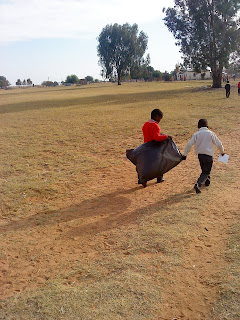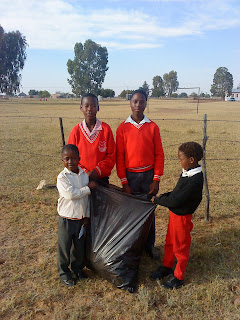Our journey started in Pretoria, around 3 pm. When we finally converged and headed out, it was four or half four. We sat in bumper to bumper traffic for almost two hours in joburg. (Surprise) Our first destination was a little town nestled in the mountains just north of Lesotho called Clarens. We didn't arrive until half ten, and it was positively freezing. I think the temp, according to the thermometer in the car, was minus 7 c. Remember, nothing is insulated or heated in africa. Thank god i brought my sleeping bag. I also sleep fully clothed. So, i did not get frostbitten.
The next morning, i had the chance to view the gorgeous surrounds. Tall pine trees, even taller mountains, some teepees, it was like an american ski town without the snow or ski slopes. The town has art galleries, coffee shops and other specialty stores. The microbrewery was disappointing, but was a nice alternative to the (crappy) usual beer we drink.
The other 4 family members had tickets to watch some World Cup action, but I was just along for the ride. I did, however, get sucked in to the fun, learned how soccer "works" and really enjoyed watching multiple games at pubs and restaurants. Several witnesses could tell you I could officially be described as a fan, according to my jumping up and down, booing, cheering, and overall "ke nako" feeling. Mzanzi! Even though Bafana Bafana didn't make it out of the 3rd round, I met some people from Chile and cheered the Chilean team, of course cheered for USA vs. Algeria, which was a totally exciting game.
Port Elizabeth has been poo-pooed by several other volunteers who have previously visited, but i absolutely loved it. We stayed 3 nights, which was a goodly amount to preview what the city has to offer. The beaches are gorgeous, it's not nearly as big as Capetown but with some of the same beauty, has a much more laid-back vibe, and is actually called "The Friendly City" of South Africa. The art museum, which was conveniently located near the FIFA Fan Park, was filled with incredible modern art. Incredible! I wanted to take photos of everything, but the guard insisted I show him each photo (I think he just wanted to make sure I took a nice one, but it was still distracting) so I just snapped one of my favorite pieces. It is so incredible to see that South Africans are capable of producing creative works that rival those from any other nation. And are maybe even more provocative because of the racial tensions that accompany the history of this place.
One day in P.E. we spent the day at Addo Elephant park and saw over 30 elephants. They were so close we could have probably touched them (with a long stick), and there is nothing more incredible than watching elephants that close! You can really see the different personalities, watch the babies play, see their massive hulk and strength, but they are also gentle as well. And those eyes...they really keep an eye on you. So curious!
The last night of our journey, we stayed in this swanky "cottage" in Pretoria. The backpackers were all booked and overcharging out the wazoo, so someone hooked us up with another place. Chandeliers, individual bathrobes, gourmet breakfast, terrace, veranda, granite countertops in the kitchen...ahh. Who says the life of a volunteer must be suffering? We cooked mushroom risotto, shared sparkling wine, and basked in the glow of USA's win over Algeria, and I was giddy 'cause Bill Clinton was in Pretoria watching the game at the same time I was. Who knew?
One of my proudest moments was teaching my young friend how to drive a stick shift- first in Borakalelo game reserve, where we saw giraffe, wildebeast, tons of birds and bock, zebra, warthogs and some squirrels- then on the way to her village. There is no better compliment than when someone says you are a great teacher, and you can watch the confidence level and skill rise.


















